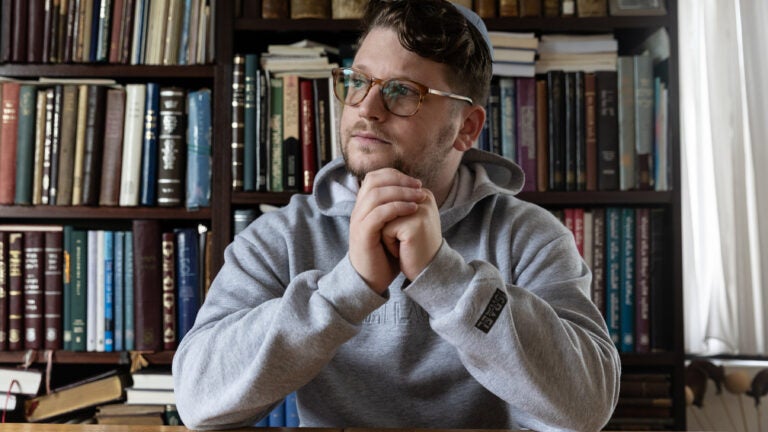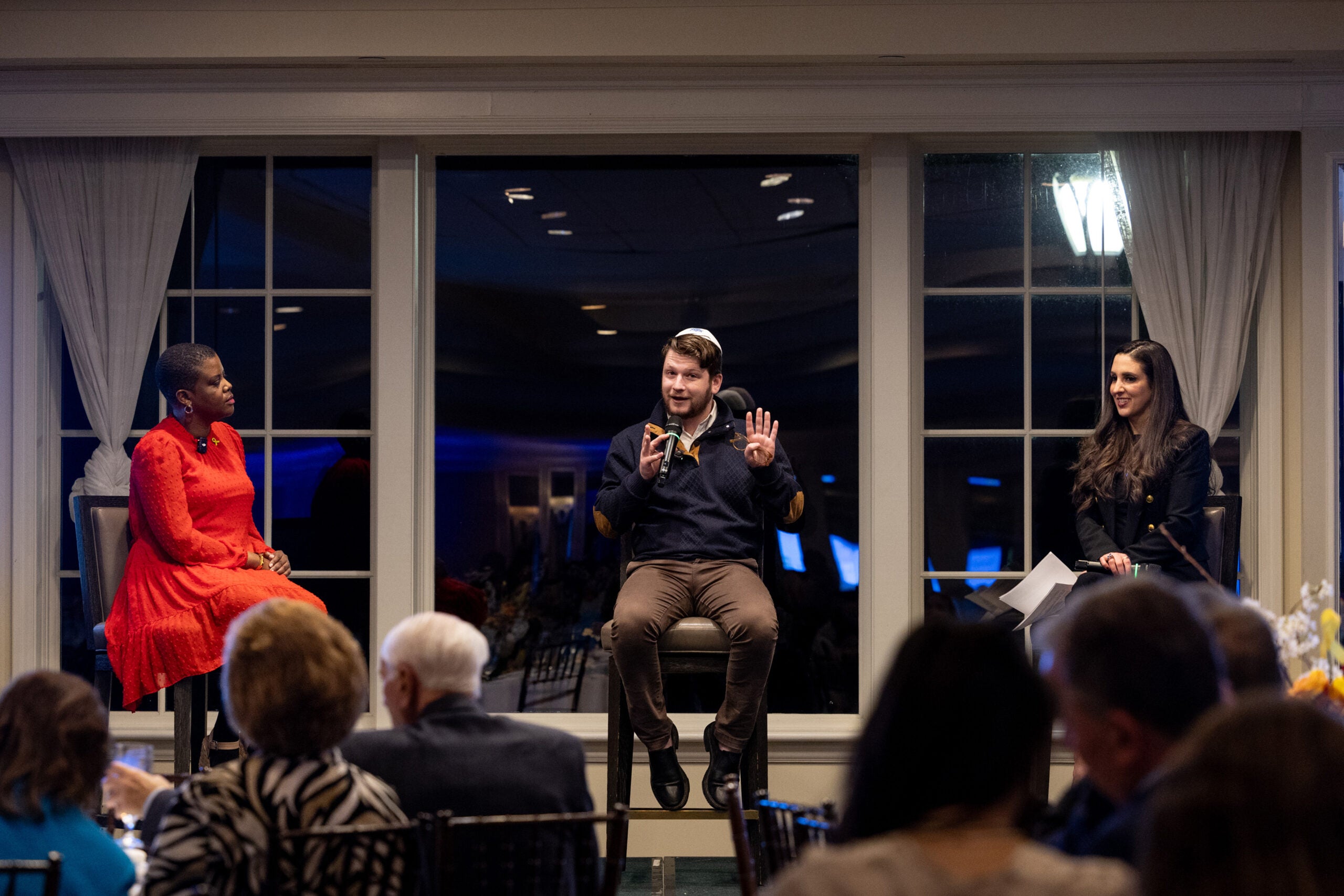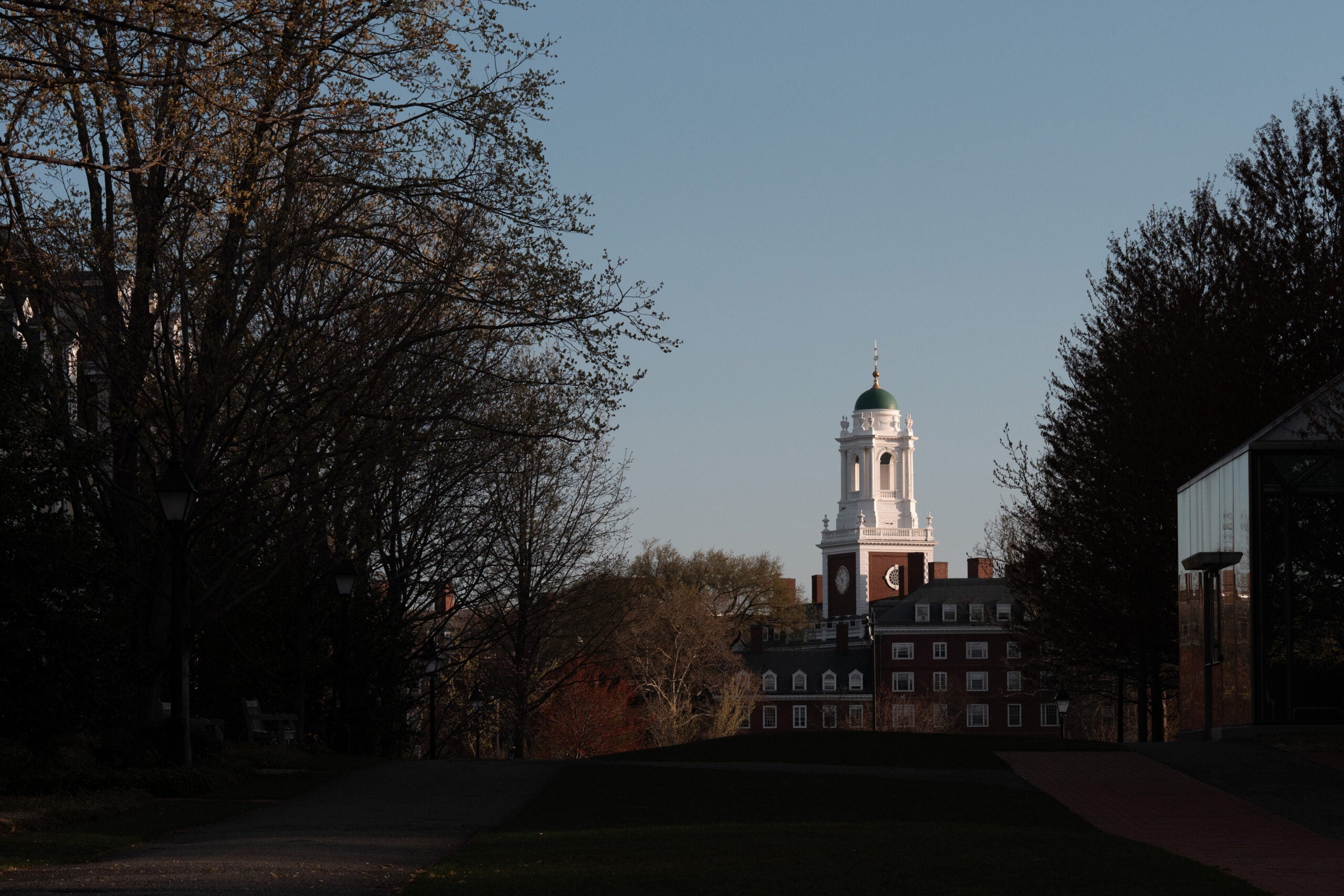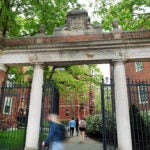The Jewish student who took on Harvard
Shabbos Kestenbaum sued Harvard over accusations that it had ignored antisemitism when he was a student. His criticism has taken him to the White House and all over the world.

Shabbos Kestenbaum moved through the crowd that came to hear him speak early last month, shaking hands and trying to mask his shyness.
He looked collegiate in tortoiseshell glasses and a barely there ginger beard. But to the more than 300 people in attendance, who were mostly Jewish, he was a rock star. He was the kid who got into Harvard University, made his parents proud and then exposed antisemitism from inside the ivory tower.
At the event, a scholarship ceremony in Lake Success, New York, for high school students fighting injustice, Kestenbaum would be speaking about antisemitism at Harvard, next to a survivor of genocide in Rwanda. “You’re the Harvard guy?” a rabbi asked him. “Don’t hold it against me,” Kestenbaum replied.
Over the past year and a half, Kestenbaum, a 26-year-old Orthodox Jew from the Bronx borough of New York City, has become the face of the Republican-led campaign against antisemitism at America’s top universities.
His determination to battle his alma mater in court helped build momentum for the Trump administration to challenge what it calls the “ideological capture” driving college campuses to the political left.

Kestenbaum has documented his unlikely trajectory on social media, with photos of himself with President Donald Trump and other politicians.
He was a second-year student at Harvard Divinity School when protests over the war in the Gaza Strip broke out on campus. A former high school debate captain, he took naturally to appearing in news reports as a conservative student voice and joined a roundtable of students in Washington to discuss antisemitism at universities.
In May 2024, he graduated from the divinity school. And then in July, he was a featured speaker at the Republican National Convention.
In the months since, Kestenbaum’s agenda for higher education has become nearly identical to Trump’s. To root out antisemitism, Kestenbaum believes schools should have, among other things, stronger disciplinary measures against protesters who violate the law or university policy; reform of curriculum that he says amounts to left-wing indoctrination; and the deportation of international students who have broken the law.

Kestenbaum said he had wealthy patrons who were helping finance his litigation, though he would not reveal their identities. He casually mentioned that he spoke “with the guys on DOGE,” or the Department of Government Efficiency, a group that Elon Musk has led to reduce the size and spending of the federal government.
“They reached out to me, and I’m going to sound braggadocios, but I’m active in this space,” he said in one of several conversations with The New York Times. “I was more than happy to help.”
In January 2024, he was among six Jewish students at Harvard who sued the university, accusing it of becoming “a bastion of rampant anti-Jewish hatred and harassment.” The case was settled the day after Trump’s inauguration, but Kestenbaum refused to join the settlement. He broke off on his own and continued to litigate.
His lawsuit describes a poisonous atmosphere at Harvard. As an example, he cited in court papers a social media message that taunted a “pro-genocide sophomore” who “looks just as dumb as her nose is crooked.”
His complaint said that Harvard ignored his many, increasingly angry reports that pro-Palestinian activists were harassing Jewish students. It also said that he was stalked on campus by protesters who were trying to intimidate him, and that he was kicked off a divinity school WhatsApp group chat for his views.
Harvard declined to comment on Kestenbaum’s claims. But its lawyers said in court documents that the university “has not been, nor will it ever be, deliberately indifferent” to complaints of antisemitism.
On Tuesday, the school published two reports, totaling about 500 pages, documenting widespread antisemitism and Islamophobia on campus and proposing reforms. The report on Islamophobia said Arab, Muslim and Palestinian students had also reported experiencing harassment, such as being called slurs including “terrorist” and “towelhead.” These students and faculty members said they felt they could not freely express their political opinions on campus, according to the report.
The two reports were accompanied by a letter from Harvard President Alan Garber, apologizing for not having done more to protect students.
But protesters and free speech advocates have said that efforts to stop antisemitism on campuses have often been too heavy-handed. They argue that the definition of antisemitism that Harvard uses, which it recently adopted as part of the settlement of the first lawsuit that Kestenbaum was a part of, is so broad that it has been used to crack down on pro-Palestinian speech.
Kestenbaum has not always identified with conservative causes. He registered as a Democrat when he turned 18 and supported Sen. Bernie Sanders, I-Vt. But like some other lifelong Democrats who are Jews, he shifted right after the campus protests.
While some Democrats view Republican calls to fight antisemitism skeptically, Kestenbaum said that this was not the time to shrink from “making a fuss,” and that he was willing to speak aloud what many Jews believe but keep to themselves.
“Shabbos Kestenbaum has given voice to the anger, horror and indignation that is felt by a large number of people,” said Kenneth Marcus, CEO of the Louis D. Brandeis Center for Human Rights Under Law, which fights antisemitism on campuses. The group had separately sued Harvard and settled.

His popularity reflects a deepening fear among Jews that they are no longer entirely welcome on U.S. campuses, his supporters say.
“Yesterday I was in Dallas,” Kestenbaum said recently. “Tomorrow I go to Miami.” Not long ago, he spoke in Jerusalem, where he was a guest in the home of Isaac Herzog, the president of Israel. In two weeks, he will speak in Amsterdam.
On Thursday, he was at the White House, in the Rose Garden, as Trump signed an executive order establishing the Religious Liberty Commission during a National Day of Prayer event. Kestenbaum said he spoke to Secretary of State Marco Rubio about expediting the deportation of international students who broke the law and took a selfie.
Some believe his activism is both sincere and opportunistic.
After the Republican convention, Shaul Magid, a visiting professor of modern Judaism at the divinity school, wrote a gentle rebuke of Kestenbaum in The Crimson, the student paper at Harvard. “The fact that Kestenbaum, who knows my leftist views on Israel, chose to speak at the RNC after sitting in my classroom for a year, demonstrates that professors don’t indoctrinate,” Magid wrote. “They encourage independent thought.”
In an interview, Magid said he and Kestenbaum had been “pretty close.” He agreed that there were problems with how the divinity school and the university dealt with the protests.
“But I think that he was exaggerating the situation,” he said.

Kestenbaum, the sixth of seven children, said he comes from an outsider background. His parents, a rare book dealer and an early childhood educator, are British immigrants, and at the divinity school, he said, he stood out for being an Orthodox Jew. The school held community tea once a week, he said, “and there was never any kosher food.”
“Being an Orthodox Jew who supported the land of Israel as a religious mandate was something that was never once accepted,” he added.
One of his favorite professors was David Wolpe, a prominent rabbi from Los Angeles who was a visiting scholar. Wolpe caused a stir by resigning from a Harvard advisory panel on antisemitism, saying he did not feel he could make a difference.
He applauded his former student for sticking to his cause. “He was uncompromising and unstinting in calling out what was going on,” Wolpe said in an interview.
Kestenbaum relishes his new role — the travel, the people, the sense of higher purpose. He says he wants to be seen as inspirational, not oppositional.
As far as he knows, he is the only Trump supporter in his extended family, he said recently, sitting in the book-filled living room of his childhood home.
Growing up, he said, the Friday night dinner table was open to everyone — Jews and non-Jews, Joe Biden and Trump supporters. A doormat is inscribed “Welcome to Joe and Kami’s House,” referring to the family’s cats, Joe and Kamala. The family adopted and named them as “good luck charms” before the 2020 election, Kestenbaum said.
Asked what kind of career his advocacy might lead to, he suggested perhaps a role in public policy.
For now, he is planning to move to Los Angeles for a job at PragerU, a nonprofit “hub for pro-American content online,” according to its website. In the role, he said he will preach ideas including “the importance of religion, the importance of free market capitalism, the importance of holding institutions of higher learning accountable.” He hopes to reach the next generation of conservatives.
This article originally appeared in The New York Times.








Conversation
This discussion has ended. Please join elsewhere on Boston.com